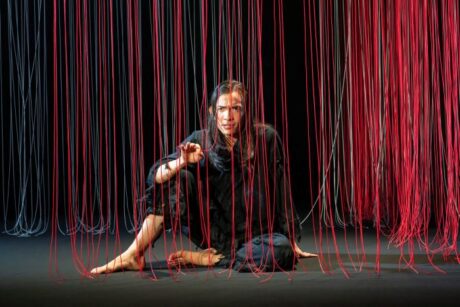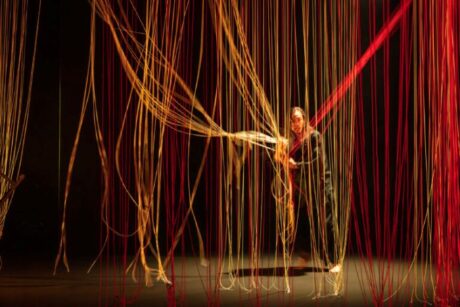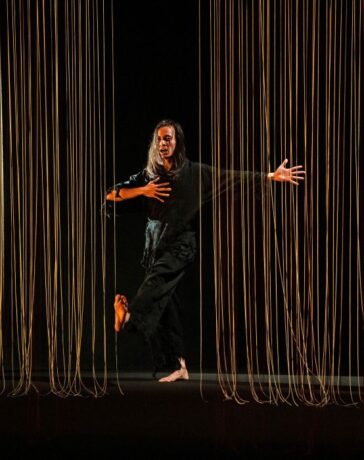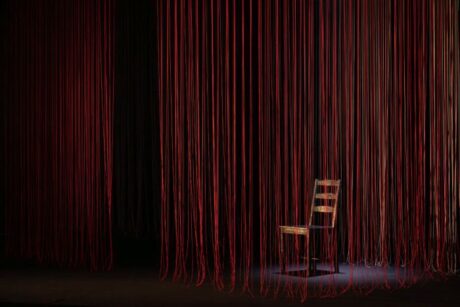Launching the Japan Society’s 2025-26 season is its commissioned world-premiere production of Kinkakuji (The Temple of the Golden Pavilion), adapted for the stage from Yukio Mishima’s 1956 novel of the same name by Leon Ingulsrud, co-founder of the SITI Company (Saratoga International Theater Institute), and Korean-American actor Major Curda. Now playing a limited engagement at the Society’s Manhattan headquarters, the rare show is staged in conjunction with its Fall 2025 Yukio Mishima Centennial Series Emergences, drawn from the writings of the Japanese post-war author (1925-70) and five-time nominee for the Nobel Peace Prize in Literature.

The solo performance is presented in the form of a fever-dream monologue, delving into the increasingly disturbed psyche of the alienated Zen Buddhist acolyte Mizoguchi, embodied by Curda, barefoot and dressed all in black (costume by Meena King), to relay the true story of his post-WWII deliberate act of arson, setting fire to the golden 14th-century Kinkakuji Temple in Kyoto, and his motivations for doing so. Under the direction of Ingulsrud, Curda, in a flawless tour-de-force performance, actively moves around the stage, delivers his memories and self-analysis in first-person direct address to the audience, changes his voice and demeanor in imitation of some of the significant people and conversations that led him to this point, and repeats many words, phrase, and lines to indicate the stuttering for which he was taunted.
He also interacts with the stark but resonant scenic design by Berlin-based artist Chiharu Shiota, who collaborated with Ingulsrud and Curda on the development of the show. Consisting of two wooden chairs, a stand-up mic, and her signature hanging strands of yarn, seen here for the first time in a US venue, the abstract set symbolizes the tangled web and ultimate unraveling of Mizoguchi’s mind, as he moves with a dancer’s agility in front of, behind, and through the curtain of yarn, creating the walls of a room, tying and entwining the strands, holding them together, and releasing them a few at a time, all in keeping with his erratic mood swings and the story he tells.

As the memory play progresses, the pace picks up, Curda becomes more and more agitated, talking faster, drawing connections between the characters and traumatic episodes of sexual assault, murder, and suicide that haunt him, and fully immersing us in his dreamscape of nightmarish thoughts and unstable emotions – or lack thereof, at times feeling completely disassociated – and his obsession with the beauty of the sacred Kinkakuji temple, which he burns to the ground and reduces to ashes, in an irrational attempt to possess its perfect aesthetic by destroying it, after he’s been deemed ugly throughout his agonized life.
Curda’s impactful performance is enhanced with lighting (by Marie Yokoyama) that sometimes transitions slowly, other times dramatically, and shines a spotlight on the actor, sound (by Padra Crisafulli), with original music (by Ethan Phelps), that sets the locales and tones, and includes a number of voiceovers and the surreal echo of Curda’s voice when speaking into the mic, and a projection and video design (by Takaaki Ando) that encompasses us in the climactic scene of the conflagration of the temple.

The staging of Kinkakuji also coincides with Chiharu Shiota: Two Home Countries, the artist’s first solo New York museum exhibition, commissioned by Japan Society and commemorating the 80th anniversary of the end of World War II. After the conclusion of Kinkakuji‘s theatrical run, Shiota’s stage set will be reinstalled as part of her site-specific show, which explores wartime experiences and memories, and parallels between the human tragedy of war and the artist’s personal struggles, including confronting her own mortality (she’s a cancer survivor) and her bicultural identity, living between two home countries. The exhibition will be open for public viewing through January 11, 2026; for more information and tickets, click here.
Running Time: Approximately one hour and 50 minutes, without intermission.

Kinkakuji plays through Saturday, September 20, 2025, at the Japan Society, 333 E 47th Street, NYC. For tickets (priced at $30-58, including fees), go online.



